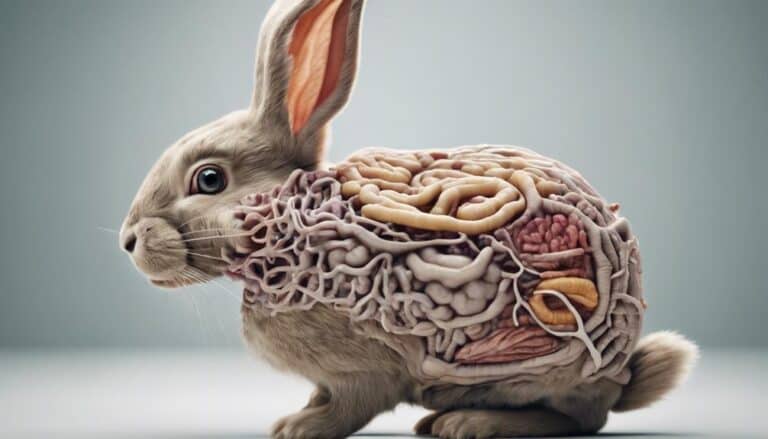If you're thinking about offering your rabbits whole milk, you might want to reconsider. Rabbits aren't designed to digest dairy products, and whole milk can cause them a lot of harm.
Their digestive systems are specifically set up to break down and extract nutrients from plant-based foods, not dairy. So, when you give your rabbit whole milk, it can lead to some serious health problems.
These can include diarrhea, stomach pain, and even life-threatening conditions like gastrointestinal stasis.
It's not just about the lactose in milk, either. Rabbits also can't handle the high amounts of sugar, fat, and calories in whole milk. All of these can contribute to obesity, which is a major issue for rabbits.
So, what can you give your rabbit instead?
Fresh veggies and fruits, hay, and limited amounts of pellets specifically formulated for rabbits are all great options.
Just remember to keep the treats to a minimum and avoid dairy products altogether. Your rabbit will thank you!
Contents
- 1 Key Takeaways
- 2 Risks of Feeding Whole Milk
- 3 Nutrient Deficiencies in Whole Milk
- 4 Impact on Rabbit Digestion
- 5 Health Issues in Baby Rabbits
- 6 Suitable Milk Replacement Formulas
- 7 Importance of Fat Content
- 8 Optimal Growth and Development
- 9 Rabbit Milk Vs. Cow's Milk
- 10 Recommendations for Feeding Rabbits
- 11 Conclusion
Key Takeaways
So, you're wondering if you can feed your rabbit whole milk? The answer is no, it's not a good idea. Whole milk can cause some serious digestive issues and even malnutrition in rabbits.
The reason for this is that rabbits don't have the enzymes needed to digest lactose, a sugar found in milk. This means that drinking whole milk can lead to stomach problems and other health issues.
If you want to give your rabbit a milk-based treat, you're better off using a rabbit-specific milk formula or even goat's milk. These alternatives are easier for rabbits to digest and can be a healthy addition to their diet.
Whole milk also lacks some essential nutrients that are crucial for rabbit growth and development. So, it's best to stick with a balanced diet of high-quality hay, fresh veggies, and limited pellets specifically formulated for rabbits.
Risks of Feeding Whole Milk
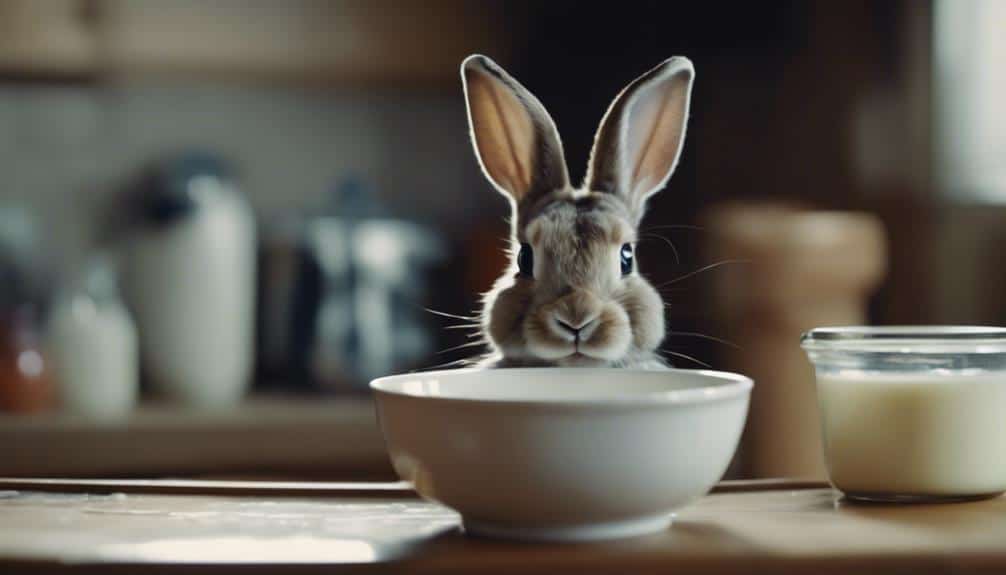
Feeding whole milk to rabbits is a big no-no. They're lactose intolerant, which means they can't digest the high levels of lactose and casein in milk.
Baby rabbits might seem like they'd benefit from the nutrients in milk, but they're better off with their mom's milk or a specialized formula that's designed for their specific needs.
Rabbits have super sensitive stomachs, so any changes to their diet can cause big problems. If you introduce whole milk, it can mess with the balance of their gut bacteria, leading to digestive issues like diarrhea.
In some cases, it can even be life-threatening.
Whole milk also lacks the essential nutrients and fiber that rabbits need to thrive. Without these important components, rabbits can end up malnourished and stunted.
Plus, whole milk is high in calories and fat, which can lead to obesity and other health problems if it's not balanced with plenty of exercise and a proper diet.
Nutrient Deficiencies in Whole Milk
When you feed your rabbits whole milk, you need to think about the nutrients they might be missing out on. Compared to special rabbit food, whole milk just doesn't have everything they need.
This can lead to tummy troubles and health problems.
Rabbits have very specific dietary needs, and whole milk alone can't meet those needs.
So, it's crucial to understand what's in whole milk and how easily your rabbits can digest it.
This way, you can make sure they're getting a balanced diet.
Nutrient Content Comparison
When it comes to feeding baby rabbits, whole milk isn't a suitable substitute for rabbit milk. In fact, whole milk lacks essential nutrients and antibodies that are critical for the proper growth and development of baby rabbits. This can lead to health issues if they're fed whole milk instead of rabbit milk.
Let's compare the nutrient content of rabbit milk and whole cow's milk. Rabbit milk contains 12-13% protein, while whole milk has only 3.2%. The fat content is also significantly higher in rabbit milk, at 10-12%, compared to 3.25% in whole milk. Carbohydrates make up 2-3% of rabbit milk, but 4.8% of whole milk.
One key difference is the calcium content. Whole milk has much higher levels of calcium than rabbit milk, which can be harmful to rabbits. This can cause kidney damage and other health problems. Additionally, whole milk contains higher levels of lactose, which can be difficult for baby rabbits to digest. This can lead to diarrhea and dehydration.
The unique fatty acid profile in rabbit milk is vital for the healthy growth and development of baby rabbits. Unfortunately, whole milk can't replicate this, making it an unsuitable substitute.
Digestibility Concerns
Rabbits have a hard time digesting lactose, a sugar found in whole milk. This can lead to nutrient deficiencies, particularly in calcium and protein, which are crucial for their growth and development.
When rabbits drink whole milk, the lactose doesn't get broken down in their gut, causing digestive problems and making it harder for them to absorb essential nutrients.
This can result in a lack of essential nutrients necessary for the overall health of the rabbit. Whole milk also has a lot of sugar, which disrupts the balance of gut bacteria, leading to gastrointestinal problems and malabsorption of key nutrients.
On top of that, whole milk has too much fat for rabbits, which can lead to obesity and related health issues if fed consistently.
To ensure healthy growth and development, it's essential to provide rabbits with a balanced diet that meets their specific nutritional needs.
Whole milk isn't a suitable option, as it can cause significant digestive problems and nutrient deficiencies.
Impact on Rabbit Digestion

Feeding milk to rabbits can be a problem for their digestion. Rabbits, especially adults, don't have the enzymes to break down lactose, a sugar found in milk. This means that if you give adult rabbits whole milk or dairy products, it can lead to bloating, diarrhea, and stomach pain.
This is different from baby rabbits, who naturally drink their mother’s milk. But even baby rabbits can have problems if they’re fed milk-based formula instead of their mother’s milk. The bacteria in their gut, which are important for digestion, can get out of balance when they drink milk. This can cause digestive problems and affect how well they absorb nutrients. It’s essential to provide the right nutrition to ensure their health and development. For orphaned baby rabbits, using a specially formulated rabbit milk replacer is crucial, as it closely mimics their mother’s milk and supports healthy gut flora. Using inappropriate substitutes like baby rabbits and puppy milk can further complicate their digestive issues, leading to long-term health problems if not addressed properly.
Rabbits digest milk differently than other animals because their gut system is unique. When you feed them milk, it can throw their digestive system out of balance, which can affect their overall health. That's why it's important to avoid giving rabbits whole milk and instead find other foods that are better for them.
It's crucial to prioritize their nutritional needs.
Health Issues in Baby Rabbits
Baby rabbits are super fragile, especially when it comes to their tummies. They can get diarrhea or constipation, which can be really dangerous and even life-threatening if not treated promptly.
Infections and injuries can be disastrous for these little guys, so it's crucial to get them to a vet ASAP if you notice anything wrong.
On top of that, you need to keep their environment warm and cozy to prevent hypothermia.
Lastly, making sure they're getting enough nutrition and staying hydrated is vital. Dehydration can sneak up on them quickly, so you need to keep a close eye on their eating and drinking habits.
Baby Rabbit Digestion
When it comes to raising healthy baby rabbits, understanding their delicate digestive systems is key. Their tummies are super sensitive, so it's crucial to feed them the right foods to prevent health problems.
For instance, you shouldn't give baby rabbits whole milk. They're lactose intolerant, which means they can't digest lactose, a sugar found in milk. Since they don't have the enzyme lactase to break it down, drinking whole milk can lead to digestive issues, diarrhea, and even constipation.
This can cause a bunch of problems, including nutrient deficiencies, which can hinder their growth and development. Here's a breakdown of what can happen:
| Issue | Consequence |
|---|---|
| Lactose intolerance | Digestive upset, diarrhea, and constipation |
| Nutrient deficiencies | Malnutrition, stunted growth, and overall health problems |
| Lack of essential antibodies found in rabbit milk | Increased susceptibility to infections and compromised immune system |
| Unsuitable protein and fat levels in whole milk | Inadequate nutrition, leading to poor weight gain, weak bones, and muscle development issues |
To keep your baby rabbits healthy, it's essential to give them a milk substitute specifically designed for their nutritional needs. This will support their digestive health and overall well-being.
Nutritional Needs
Understanding baby rabbits' nutritional needs is crucial to prevent health problems and promote healthy growth. Their delicate digestive systems require a diet rich in protein and fat.
You might think whole milk is a good option, but it's not ideal for rabbits because they can't handle lactose well. Rabbit milk has more protein, fat, and less lactose than cow's milk, which makes a big difference.
Feeding baby rabbits whole milk can cause gut problems and nutrient deficiencies because it disrupts their gut flora.
Instead, you should feed them a rabbit-specific milk substitute formula like Cimicat or KMR. These formulas are designed to mimic rabbit milk's nutritional composition, providing the necessary protein and fat for healthy growth.
Using the right formula can prevent health issues like diarrhea, bloating, and malnutrition, which can be really bad for the rabbit.
Milk Alternatives
When it comes to feeding baby rabbits, it's crucial to avoid using whole cow's milk. In the wild, rabbits rely on their mother's milk, but domestic rabbits can face serious digestive issues if fed cow's milk.
Instead, you should opt for a rabbit-specific milk substitute to promote their health and well-being.
These special formulas mimic the nutritional composition of a rabbit's mother's milk, making them easier for baby rabbits to digest. They also provide the necessary nutrients for growth and development.
When selecting a milk alternative, make sure to choose a formula specifically designed for young rabbits. These formulas often contain probiotics, which help promote healthy gut flora in baby bunnies.
Stay away from whole milk or other dairy products, as they can cause diarrhea and other gastrointestinal issues in young rabbits.
Suitable Milk Replacement Formulas
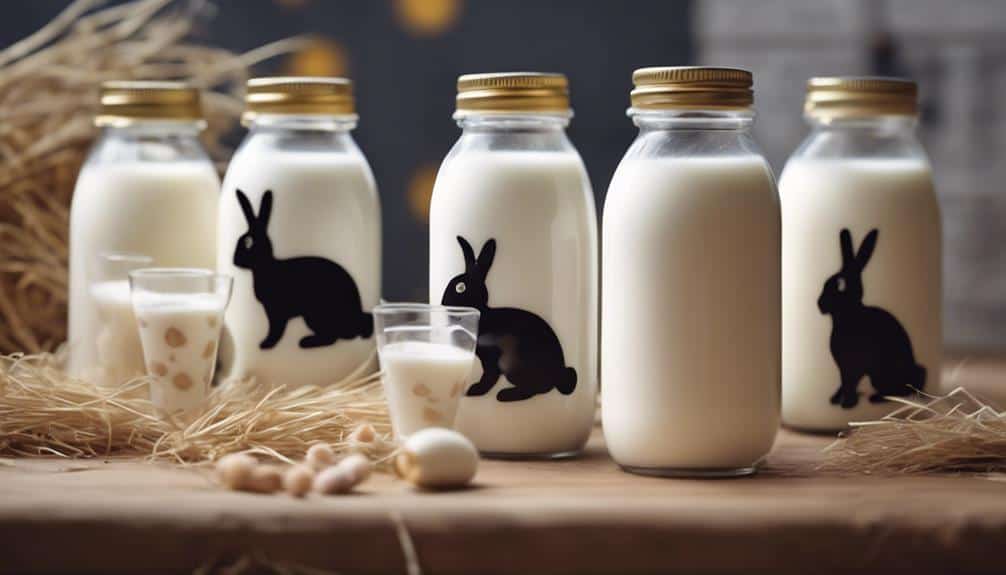
When it comes to milk replacement formulas for baby rabbits, you'll want to use a specifically designed substitute milk formula like Cimicat milk substitute powder or a similar product.
One option you could consider is the KMR Kitten Formula. Although it's designed to promote healthy growth in kittens, it can also be suitable for baby rabbits.
Another alternative is goat's milk. Goat's milk is a better option than cow's milk because its nutritional profile is closer to rabbit milk.
Remember to introduce any new milk replacement formula gradually to prevent digestive issues in baby rabbits. You don't want to shock their system with a sudden change.
It's also crucial to follow the recommended feeding schedule and amounts. Overfeeding can lead to digestive problems, so be sure to stick to the guidelines.
Importance of Fat Content
Fat content is crucial when it comes to nourishing baby rabbits. Rabbit milk is packed with around 47% fat, which provides essential nutrients for their growth and development.
If you're considering alternatives like cow's milk, keep in mind that whole cow's milk has a much lower fat content – ranging from 3.5% to 4%. This isn't enough to meet the nutritional needs of baby rabbits.
Kitten Milk Replacer (KMR) might seem like a decent option, with a fat content of 27%, but it still falls short of the ideal fat percentage for rabbit kits. To get closer to the recommended 47%, you can mix formulas like Zoologic 33/40 and Multimilk.
Using regular, not low-fat, cow's milk as a substitute for rabbit milk can lead to nutritional deficiencies and health issues in young rabbits due to its inadequate fat content.
Getting the fat content right in the milk replacement formula is vital for the proper development of domestic baby rabbits.
Optimal Growth and Development
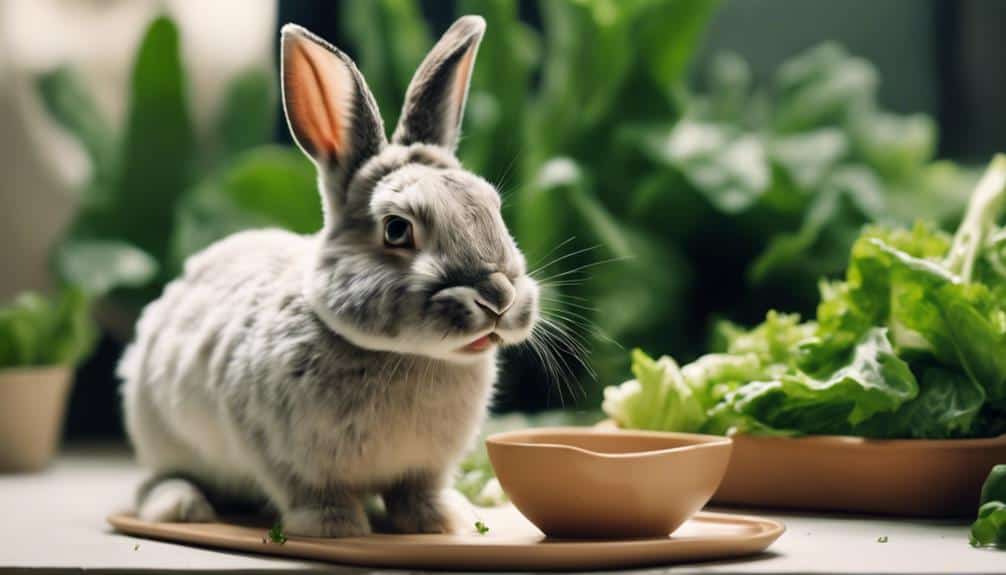
When it comes to feeding baby rabbits, you want to make sure they're getting the nutrients they need to grow strong and healthy.
Baby rabbits need a diet rich in calcium to support the development of strong bones and teeth. Without enough calcium, they mightn't grow properly.
Fat is also essential for providing energy and supporting the growth of young rabbits. So, you'll want to make sure they're getting enough of it in their diet.
Using a milk formula designed specifically for rabbits is a great way to guarantee they're getting the right balance of nutrients for their growth. These formulas are specially made to meet the unique needs of baby rabbits.
One thing to avoid is whole milk. It's not suitable for baby rabbits and can lead to digestive issues and nutrient deficiencies, which can hinder their growth and development.
Rabbit Milk Vs. Cow's Milk
When you compare rabbit milk to cow's milk, you'll notice some big differences in what they contain. Rabbit milk has 12-13% protein, 10-12% fat, and 2-3% carbohydrates, which are all essential for baby rabbits. On the other hand, cow's milk has 3.5% protein, 3.5% fat, and 4.5% carbohydrates.
If you feed cow's milk to rabbits, it can cause digestive problems and lead to nutritional deficiencies.
One major difference is the amount of lactose and fiber. Rabbit milk has very little lactose and a lot of fiber, making it easy for baby rabbits to digest. Cow's milk, on the other hand, has a lot of lactose and very little fiber. This can cause problems in rabbits, like an imbalance of gut bacteria, diarrhea, and constipation.
Mother rabbit's milk is crucial for the healthy growth and development of baby rabbits. If you replace rabbit milk with cow's milk, it can lead to malnutrition, stunted growth, and even death. So, it's really important to give baby rabbits the right milk to keep them healthy.
Recommendations for Feeding Rabbits
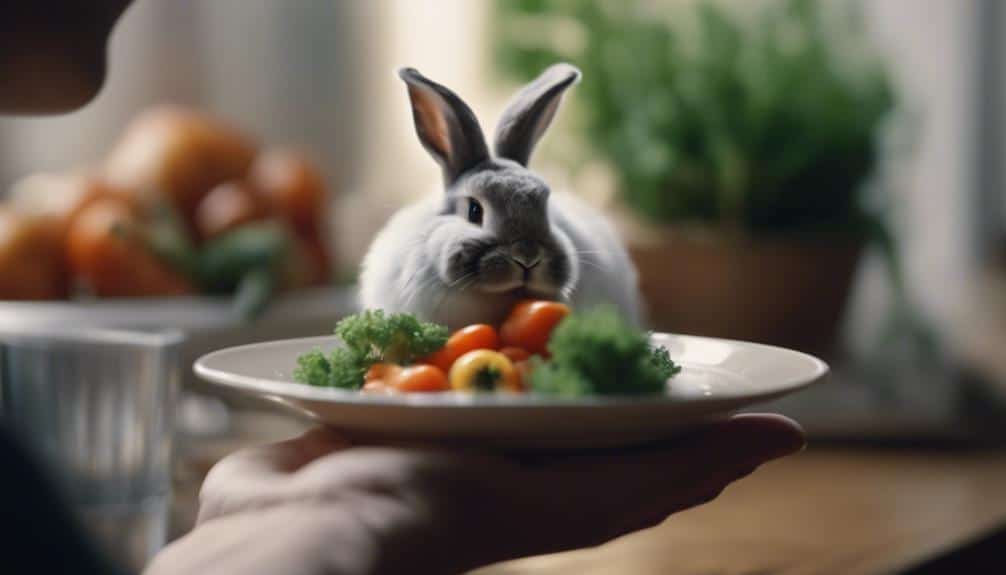
Feeding your rabbits the right way is crucial for their health and growth.
When it comes to feeding your rabbits, consistency is key. Establish a regular feeding schedule to ensure they're getting all the nutrients they need at the right time.
If you're caring for young or orphaned rabbits, bottle feeding is the way to go. Use a suitable formula like Kitten Milk Replacer to give them the best start in life.
Probiotics like Acidophilus are also super important. Adding them to your rabbit's diet helps create a healthy gut and makes digestion easier.
Conclusion
When it comes to feeding rabbits, it's essential to remember that they've specific dietary needs. You've probably heard the old saying 'you are what you eat,' and this is especially true for rabbits.
Whole milk isn't a suitable option for rabbits. Instead, you should opt for rabbit-specific milk replacement formulas like Cimicat or KMR. These formulas provide the right nutrients and fat content for your rabbits to grow and develop properly.
By choosing the right milk replacement, you can help your rabbits thrive and avoid potential health issues associated with feeding them whole milk. It's all about making informed choices to prioritize their well-being.






